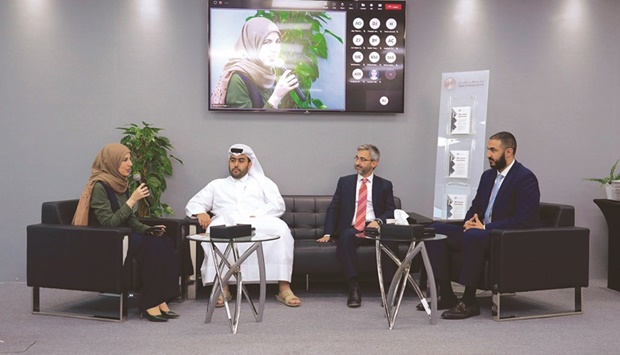The College of Islamic Studies ( CIS) at Hamad Bin Khalifa University presented an international conference “Entrepreneurship, Sustainable Development and the Halal Economy: Concepts, Framework and Practice” recently. The conference was a result of a collaboration between the college, Qatar Financial Centre Authority (QFCA), and Qatar Development Bank (QDB).
Expert-led discussions provided unique perspectives on under-researched areas, aiming to supplement the literature gap on entrepreneurial activities promoting sustainable development and the halal economy. Framing the conference was a recognition of the significant role of entrepreneurs in providing appropriate halal goods and services that satisfy the needs of Muslim populations and have the unique features and characteristics that fulfill religious values and principles. The conference addressed growing opportunities within the halal economy, which is estimated to grow up to $6.04 trillion by 2024
Welcome remarks by Dr Habib Ahmed, professor and Sharjah Chair in Islamic Law and Finance, Durham University, UK; Dr Emad El-Din Shahin, dean of CIS, HBKU; and Dr Syed Nazim Ali, director of the Research Division, CIS, set the context for the discussions. The keynote address was delivered by Abdulrahman Hesham al-Sowaidi, acting CEO, QDB.
Four academic sessions over the two days covered topics such as the impacts and challenges of Islamic entrepreneurship in the halal economy, ethnographic perspectives of entrepreneurship, policy, and financing models for advancing the entrepreneurial ecosystem. Speakers exchanged insights on best practices research and engaged on the approaches adopted by Qatar, Nigeria, the UK, Malaysia, India, and other countries. In addition, two panel sessions titled, ‘Impact Banking for SMEs and the Halal Economy’ and ‘Islamic FinTechs and the Halal Economy’ were held with industry experts in an effort to bridge the gap between academia and the industry.
The final session, “Islamic FinTechs and the Halal Economy”, included pitch presentations by QFC-licensed FinTech companies, Cieltech, Bawaba, Dipsy, Vnueron, SkipCash, and Ethis. QFC is addressing the growing need for digitalisation by helping Qatar’s emergence as a regional FinTech hub.
Dr Dalal Aassouli, associate dean for Academic Affairs at CIS said: “Entrepreneurs continue to have a key role in achieving sustainable development and fulfilling societal needs even as initiatives have evolved over time to adjust to changing needs, innovative digital technologies, and the unique issues facing societies face today. Like other countries, Qatar is nurturing entrepreneurship to tackle a range of challenges from climate change to economic and social issues.”
Welcome remarks by Dr Habib Ahmed, professor and Sharjah Chair in Islamic Law and Finance, Durham University, UK; Dr Emad El-Din Shahin, dean of CIS, HBKU; and Dr Syed Nazim Ali, director of the Research Division, CIS, set the context for the discussions. The keynote address was delivered by Abdulrahman Hesham al-Sowaidi, acting CEO, QDB.
Four academic sessions over the two days covered topics such as the impacts and challenges of Islamic entrepreneurship in the halal economy, ethnographic perspectives of entrepreneurship, policy, and financing models for advancing the entrepreneurial ecosystem. Speakers exchanged insights on best practices research and engaged on the approaches adopted by Qatar, Nigeria, the UK, Malaysia, India, and other countries. In addition, two panel sessions titled, ‘Impact Banking for SMEs and the Halal Economy’ and ‘Islamic FinTechs and the Halal Economy’ were held with industry experts in an effort to bridge the gap between academia and the industry.
The final session, “Islamic FinTechs and the Halal Economy”, included pitch presentations by QFC-licensed FinTech companies, Cieltech, Bawaba, Dipsy, Vnueron, SkipCash, and Ethis. QFC is addressing the growing need for digitalisation by helping Qatar’s emergence as a regional FinTech hub.
Dr Dalal Aassouli, associate dean for Academic Affairs at CIS said: “Entrepreneurs continue to have a key role in achieving sustainable development and fulfilling societal needs even as initiatives have evolved over time to adjust to changing needs, innovative digital technologies, and the unique issues facing societies face today. Like other countries, Qatar is nurturing entrepreneurship to tackle a range of challenges from climate change to economic and social issues.”

